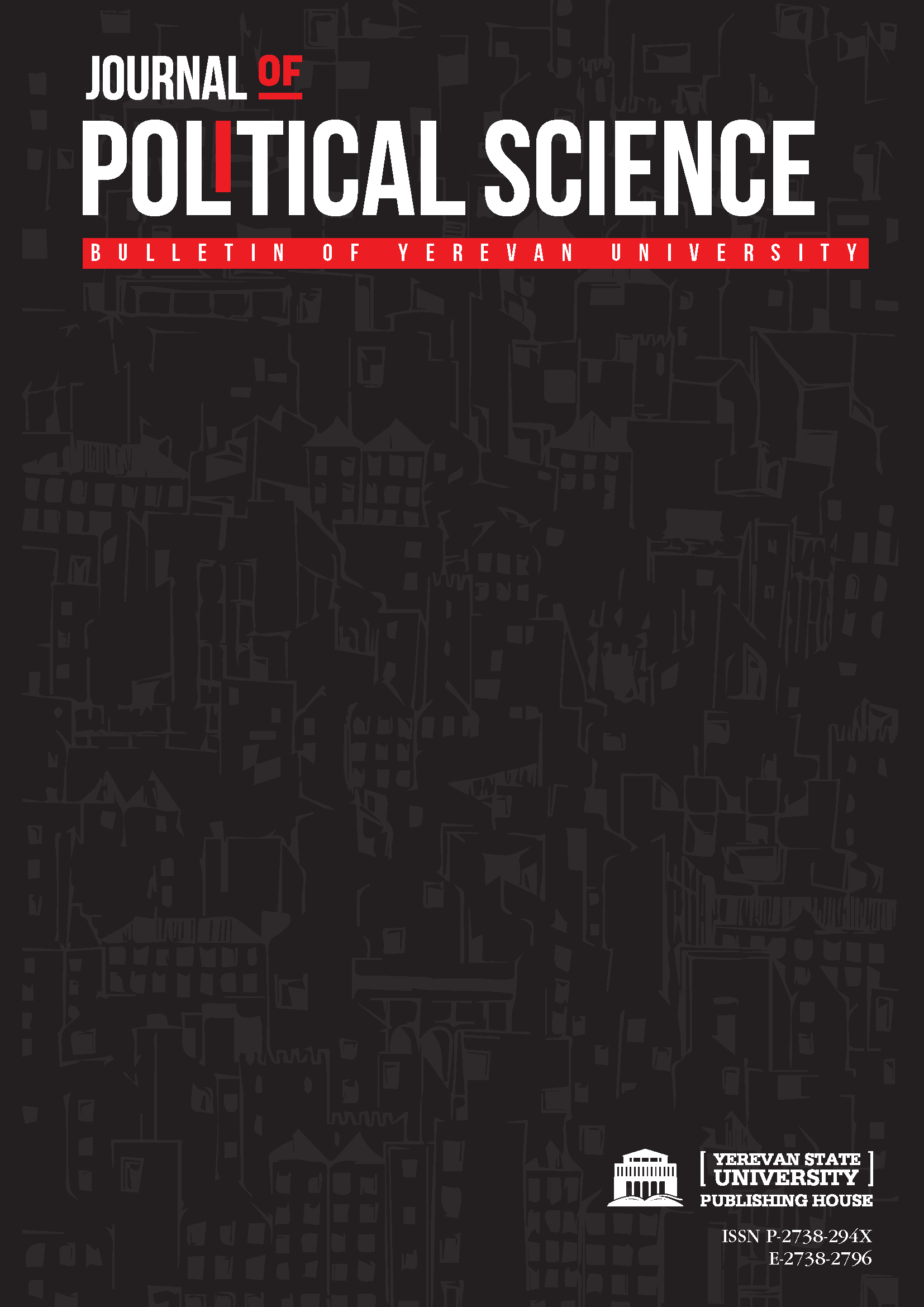Political Disinformation and Hate Speech on Facebook: the Attitude of Young Armenians Towards Modern Cyber Challenges
DOI:
https://doi.org/10.46991/JOPS/2022.1.1.040Keywords:
Cyber hate speech, political disinformation, political participation, political attitude, youth, Facebook, ArmeniaAbstract
This research explores political disinformation and hate speech on Facebook with particular stress on the attitude of the Armenian young population after Velvet revolution in Armenia.
The empirical results find that cyber disinformation and hate speech in Armenia are mainly provoked and encouraged by two general components; political and social. In the case of political factors, the ongoing domestic political situation and foreign influence interests are highlighted. Whereas, in the case of social factors, the level of media literacy and social media’s rising role in society is emphasized.
The study also reveals that despite the unclear extent of social media’s influence on people’s political participation, engagement in different social media platforms has a significantly growing role among young people, particularly in terms of developing political knowledge, getting aware of daily political news, of following politicians’ and political institutions’ activities, of discussing ongoing developments and transformations, highlighting questions and sharing opinions.
References
Allcott, Hunt, and Matthew Gentzkow. 2017. “Social Media and Fake News in the 2016 Election.” Journal of Economic Perspectives 31 (2): 211-236. https://doi.org/10.1257/jep.31.2.211
Armenian Helsinki Committee. 2019. “Hate speech monitoring.” Report. Accessed May 1, 2021. http://armhels.com/en/.
Berinsky, Adam J. 2018. “Telling the Truth about Believing the Lies? Evidence for the Limited Prevalence of Expressive Survey Responding.” The Journal of Politics 80 (1): 211-224. https://doi.org/10.1086/694258
Berinsky, Adam. 2017. “Rumors and Health Care Reform: Experiments in Political Misinformation.” British Journal of Political Science 47 (2): 241 - 262. https://doi.org/10.1017/S0007123415000186.
Chetty, Naganna, and Sreejith Alathur. 2018. “Hate speech review in the context of online social networks.” Aggression and Violent Behavior 40 (May-June):108-118. https://doi.org/10.1016/j.avb.2018.05.003.
Cohen-Almagor, Raphael . 2011. “Fighting Hate and Bigotry on the Internet.” Policy and Internet 3 (3): 1-26. https://doi.org/10.2202/1944-2866.1059
Committee, LIBE. 2019. “Disinformation and propaganda-impact on the functioning of the rule of law in the EU and its Member States.” Study. Brussels: European Parliament.
Constine, Josh. 2016. “Facebook chose to fight fake news with AI, not just user reports.” November 15, 2016. https://techcrunch.com/2016/11/14/facebook-fake-news/.
Demartini, Gianluca. 2019. “Users (and their bias) are key to fighting fake news on Facebook - AI isn't smart enough yet.” September 22, 2019. https://theconversation.com/users-and-their-bias-are-key-to-fighting-fake-news-on-facebook-ai-isnt-smart-enough-yet-123767.
Deutscher Bundestag. 2017. “Gesetz zur Verbesserung der Rechtsdurchsetzung in sozialen Netzwerken (Netzwerkdurchsetzungsgesetz - NetzDG).” https://dip.bundestag.de/vorgang/.../81582.
Duggan, Maeve, and Aaron Smith. 2016. “The Political Environment on Social Media.” October 25, 2016. Pew Research Center. https://assets.pewresearch.org/wp-content/uploads/sites/14/2016/10/24160747/PI_2016.10.25_Politics-and-Social-Media_FINAL.pdf.
Fallis, Don. 2015. “What is disinformation?” Library Trends 63 (3): 401-426. https://doi.org/10.1353/lib.2015.0014
Faris, Robert and Roberts, Hal and Etling, Bruce and Bourassa, Nikki and Zuckerman, Ethan and Benkler, Yochai. 2017. “Partisanship, Propaganda, and Disinformation: Online Media and the 2016 U.S. Presidential Election (August).” Berkman Klein Center Research Publication 2017-6. Available at SSRN: https://ssrn.com/abstract=3019414.
Fetzer, James. 2004. “Information: Does it Have To Be True?” Minds and Machines 14 (2): 223-229. https://doi.org/10.1023/B:MIND.0000021682.61365.56.
Goel, Sharad, Ashton Anderson, Jake Hofman, and Duncan J. Watts. 2016. “The Structural Virality of Online Diffusion.” Management Science 62(1): 180-196. https://doi.org/10.1287/mnsc.2015.2158.
Government of Singapore. 2019. “Protection from Online Falsehoods and Manipulation Bill.” https://sso.agc.gov.sg/Bills-Supp/10-2019.
Mihaylov, Todor, Georgi Georgiev, and Preslav Nakov. 2015. “Finding Opinion Manipulation Trolls in News Community Forums.” In Proceedings of the Nineteenth Conference on Computational Natural Language Learning, 310-314. Beijing, China: Association for Computational Linguistics. https://doi.org/10.18653/v1/K15-1032.
Müller, Karsten, and Carlo Schwarz. 2021. “Fanning the Flames of Hate: Social Media and Hate Crime.” Journal of the European Economic Association 19 (4): 2131-2167. https://doi.org/10.1093/jeea/jvaa045.
Nationale, Assemblee. 2018. “Proposition de loi: relative à la lutte contre la manipulation de l'information (Texte définitif).” 20 novembre 2018. https://www.assemblee-nationale.fr/dyn/15/textes/l15t0190_texte-adopte-provisoire.pdf.
Nocetti, Julien. 2015. “Contest and conquest: Russia and global internet governance.” International Affairs 91(1): 111-130. https://doi.org/10.1111/1468-2346.12189.
OHPI. 2014. “Press Release: Launch of Online Tool to Combat Hate.” November 10, 2014. https://ohpi.org.au/press-release-launch-of-online-tool-to-combat-hate/.
Pennycook, Gordon , Adam Bear, Evan T. Collins, and David G. Rand. 2020. “The Implied Truth Effect: Attaching Warnings to a Subset of Fake News Headlines Increases Perceived Accuracy of Headlines Without Warnings.” Management Science 66 (11) (November): 4944-4957. https://doi.org/10.1287/mnsc.2019.3478
Phillips, Whitney. 2015. This Is Why We Can't Have Nice Things. Cambridge: The MIT Press. https://doi.org/10.7551/mitpress/10288.001.0001
Policy Department for Citizens’ Rights and Constitutional Affairs. 2019. “Disinformation and Propaganda-impact on the functioning of the rule of law in EU and its Member States.” Study. Brussels: European Parliament. https://www.europarl.europa.eu/RegData/etudes/STUD/2019/608864/IPOL_STU(2019)608864_EN.pdf.
Reporter ohne Grenzen. 2021. “Regulierung sozialer Medien.” https://www.reporter-ohne-grenzen.de/themen/internetfreiheit/regulierung-sozialer-medien?gclid=Cj0KCQiA_JWOBhDRARIsANymNObQHrY3zksvpqH7HTt0_1VcOqYKH6g0kChpLFiNkh-XwqNcG_23SgEaAv56EALw_wcB.
Stenberg, Georg. 2007. “Conceptual and perceptual factors in the picture superiority effect.” European Journal of Cognitive Psychology 18 (6):813-847. https://doi.org/10.1080/09541440500412361.
Theocharis, Yannis, Pablo Barberá, Zoltán Fazekas, Sebastian Adrian Popa, and Olivier Parnet. 2016. “A Bad Workman Blames His Tweets: The Consequences of Citizens' Uncivil Twitter Use When Interacting With Party Candidates.” Journal of Communication 66 (6): 1007-1031. https://doi.org/10.1111/jcom.12259.
Vanderhill, Rachel. 2013. Promoting Authoritarianism Abroad. Boulder: Lynne Rienner Publishers.
Vreese, Claes H. de, Frank Esser, Toril Aalberg, Carsten Reinemann, and James Stanyer. 2018. “Populism as an Expression of Political Communication Content and Style: A New Perspective.” The International Journal of Press/Politics 23 (4) (October): 423-438. https://doi.org/10.1177/1940161218790035.
Woolley, Samuel C., and Philip N. Howard. 2017. Computational Propaganda Worldwide: Executive Summery. Working paper 11. Oxford, UK: Project on Computational Propaganda. https://demtech.oii.ox.ac.uk/wp-content/uploads/sites/89/2017/06/Casestudies-ExecutiveSummary.pdf.
Downloads
Published
Issue
Section
License
Copyright (c) 2022 Viktorya Melkonyan

This work is licensed under a Creative Commons Attribution-NonCommercial 4.0 International License.



